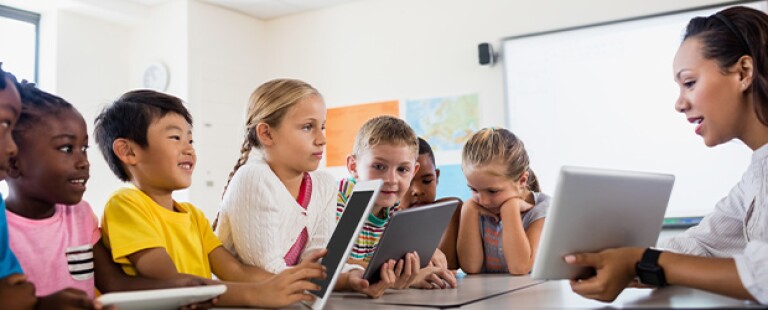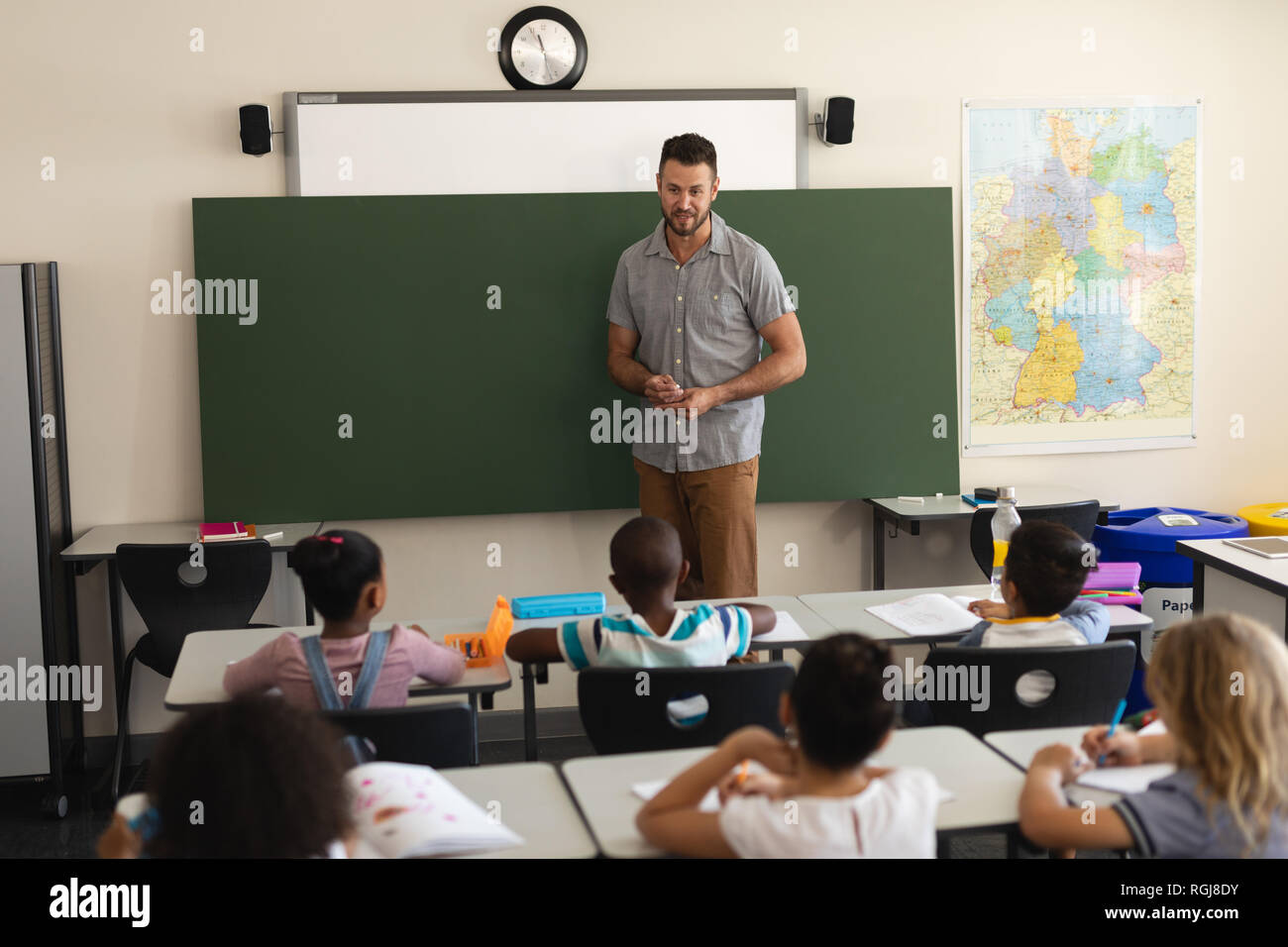Top Primary Science Tuition Singapore to Help Your Child Excel
Top Primary Science Tuition Singapore to Help Your Child Excel
Blog Article
Discover the Important Benefits of Comprehending Main Scientific Research for Young Students
The value of main science education for young learners prolongs far past mere understanding procurement; it offers as a fundamental pillar in creating essential skills such as critical reasoning, analytical, and imagination. Engaging with scientific principles via inquiry-based and interactive tasks not just grows interest but additionally lays the foundation for resistant, certain learners. As we explore these advantages further, it becomes clear that the ramifications for future scholastic and personal growth are profound. Nonetheless, what certain strategies can educators utilize to make the most of these advantages?
Enhancing Vital Believing Abilities
Promoting essential believing abilities in young learners is important for their cognitive growth and future academic success. Important thinking makes it possible for kids to evaluate details, evaluate proof, and make educated decisions, which are important skills in today's information-rich society. By participating in clinical questions, young students can enhance these abilities as they explore principles through trial and error, observation, and reasoning.
In primary scientific research education, teachers can promote essential thinking by motivating trainees to ask concerns, create theories, and carry out experiments. This hands-on strategy allows youngsters to exercise problem-solving and create sensible reasoning skills. For example, when trainees check out the buildings of materials or the principles of activity, they discover to assess their searchings for seriously and draw conclusions based upon proof.
Furthermore, discussions and collective tasks can promote essential thinking by providing chances for students to verbalize their ideas, challenge assumptions, and take into consideration varied perspectives. By developing an encouraging setting that values questions and representation, educators can support important assuming abilities that equip young learners to become independent thinkers and long-lasting students. Eventually, enhancing these abilities lays a robust structure for their future scholastic endeavors and personal development.
Cultivating Curiosity and Expedition

Key scientific research education and learning supplies a structured setting where young learners can check out various phenomena via hands-on experiments and monitorings. By enabling them to communicate with products and engage in inquiry-based learning, instructors develop chances for youngsters to formulate theories, check their ideas, and draw final thoughts. Such experiences support a feeling of wonder and excitement regarding scientific research.

Building Self-confidence in Trouble Addressing
Structure self-confidence in problem-solving is a critical component of key science education that encourages young students to approach difficulties with durability and imagination - primary science tuition Singapore. They establish crucial abilities in essential thinking and analysis when kids are encouraged to involve with scientific ideas through hands-on activities and inquiry-based learning. This process not only boosts their understanding of clinical principles yet additionally promotes a feeling of possession over their learning
To build self-confidence, educators need to create an encouraging setting where mistakes are deemed chances for growth instead than failures. This urges students to take risks and check out various options to troubles. By offering scaffolding and assistance, teachers can aid students navigate complicated jobs, progressively raising their independence in analytical situations.
In addition, collective knowing experiences, such as team jobs or experiments, can additionally enhance pupils' self-confidence as they discover to express their thoughts and pay attention to others' perspectives. These communications nurture social abilities and reinforce the concept that problem-solving is often a collective venture. Ultimately, growing self-confidence in analytical prepares young students for future academic obstacles and furnishes them with the tools necessary for lifelong discovering.
Motivating Imagination and Development
In the world of primary science education and learning, urging creative thinking and innovation is important for cultivating a dynamic knowing atmosphere. By promoting a society where young learners can discover ideas and experiment freely, teachers aid pupils develop essential thinking abilities and an enthusiasm for discovery. Creative thinking in scientific research urges kids to ask inquiries, develop theories, and engage in hands-on tasks that promote their imagination.
Incorporating flexible projects and inquiry-based knowing into the educational program allows students to express their one-of-a-kind perspectives and remedies. For instance, when tasked with resolving a problem pertaining to their atmosphere, pupils can Discover More brainstorm numerous strategies, resulting in creative results that display their originality. This not just deepens their understanding of clinical ideas yet also infuses a sense of possession over their learning process.
Additionally, creative scientific research education and learning nurtures partnership amongst peers, as students usually share ideas and improve one an additional's insights - primary science tuition Singapore. This joint spirit advertises not only innovation but also vital social skills. Thus, by prioritizing creativity and development in key science education, we equip young students to assume seriously, accept obstacles, and imagine opportunities, laying a solid foundation for long-lasting discovering and expedition
Getting Ready For Future Knowing Obstacles
Young learners' capacity to navigate future understanding obstacles rests on a strong foundation in key scientific research education and learning. This fundamental understanding furnishes trainees with crucial assuming abilities and an organized technique to problem-solving, necessary for dealing with intricate issues in an ever-evolving globe. Key scientific research cultivates inquiry-based understanding, urging trainees to ask questions, check out hypotheses, and participate in hands-on experiments.
As they create these abilities, learners become adept at examining data, this website identifying patterns, and attracting educated conclusions. Such proficiencies are vital not just in scientific areas however also in innovation, mathematics, and engineering (STEM), where interdisciplinary knowledge is progressively essential.
Moreover, main science education and learning grows a sense of curiosity and durability in young learners, enabling them to see difficulties as chances for growth. As they come across and get rid of obstacles in their clinical explorations, they build confidence in their capability to innovate and adjust.
Inevitably, a solid foundation in primary scientific research not only prepares young learners for scholastic pursuits yet additionally furnishes them with the devices essential for lifelong understanding and versatility in a swiftly changing global landscape. By buying key scientific research education and learning, we are investing in the future possibility of our learners.
Conclusion
Recognizing main science is important for young learners, as it cultivates critical thinking, curiosity, and imagination. Engaging with scientific ideas via hands-on experiments develops and improves problem-solving capabilities resilience. This foundational understanding not just outfits students to assess information and recognize patterns however additionally nurtures an inquiry-based state of mind. Ultimately, the benefits of primary science education and learning prepare children for future academic searches and infuse long-lasting learning habits necessary for growing in an ever-evolving globe.
The importance of primary scientific research education for young learners expands far beyond plain understanding purchase; it offers as a basic column in creating necessary abilities such as critical thinking, analytical, and my latest blog post creativity. By creating a supportive setting that values questions and representation, instructors can nurture important believing abilities that equip young students to end up being long-lasting students and independent thinkers. Therefore, by prioritizing imagination and development in key science education and learning, we encourage young learners to think critically, embrace obstacles, and imagine opportunities, laying a solid structure for lifelong discovering and exploration.
Young learners' capacity to browse future discovering difficulties hinges on a strong foundation in primary scientific research education and learning.Recognizing primary science is vital for young students, as it cultivates important reasoning, interest, and imagination.
Report this page